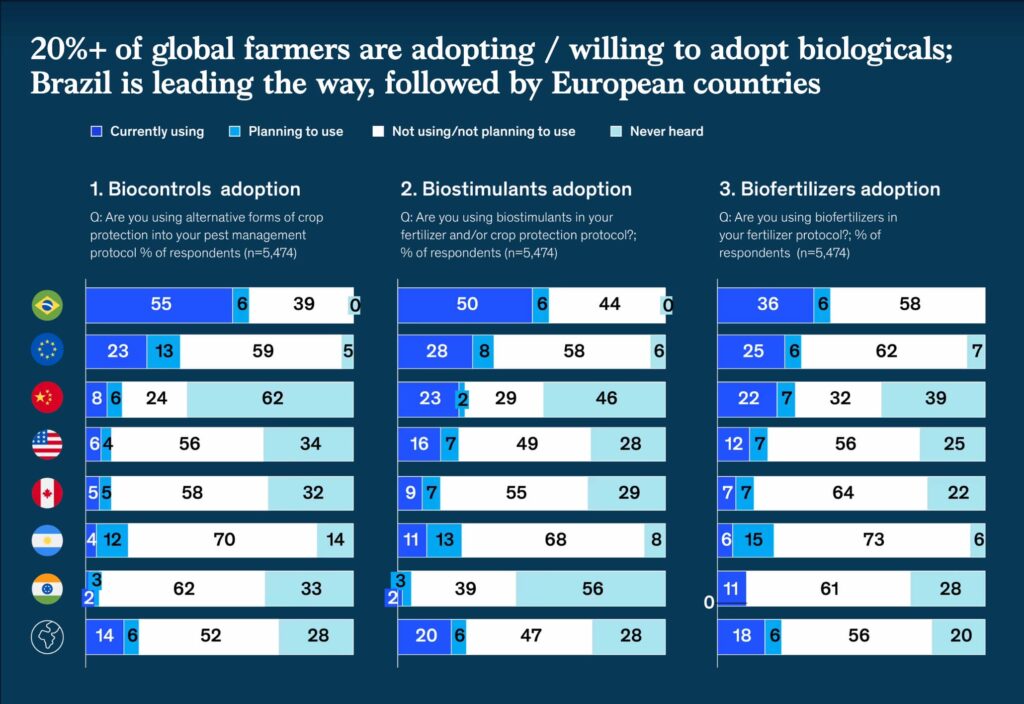Advances in agricultural technology have increased exponentially over the course of the past five decades. New innovations allow growers to expand the scale and improve the efficiency of their operations, which often can increase productivity and profit. Although these technologies have the potential to provide substantial benefits on farm, slow adoption rates have limited the potential growth of the industry.
Fully integrating new technology into farming operations involves several stages, collectively known as the technology adoption process. As such, it’s important for agricultural innovators to understand the different stages to better prepare and plan how to gain acceptance and achieve technology transfer at the farmgate.
New technologies are often met with skepticism. Because of the high input costs and narrow margins in farming, growers can be resistant to change. But other elite growers consider new methods when profits are lagging. That often is the time they try to improve. It’s important for innovators to create a solid market development plan focused on creating local relationships. Growers listen to other growers. Word of mouth recommendations can entice growers to consider learning more, moving them from being unaware to recognizing the new agricultural innovation. As growers become aware, so should the influencers in the local area. Growers rely on their trusted advisors who may be their own agronomists or the agronomists working for their local input supplier.

As interest in a new technology grows, growers often seek out more information about the technology, and as they learn more, make an evaluation of its merits. Many factors that contribute to slow adoption like cost, access and education can be overcome at the retail level by developing local retail relationships, as illustrated in a 2023 survey by Stratus. Retail partnerships are particularly important for the biological technologies, as more than half of North American retailers have a favorable attitude toward them.
According to a 2022 McKinsey Survey, the most promising opportunity for technological adoption is with biological products, as more than 20 percent of global farms have integrated biological technologies into their regular practices.
While North American farmers are leading the way in overall agtech adoption, Brazil’s adoption of biological technologies is fueling widespread agtech adoption across Latin America.

The rate of technology adoption across LATAM can be directly attributed to the rigorous testing of biological products through multiple trials across the country. Embracing large-scale, on-farm replicated trials provides robust, data-driven information that enhances product credibility.
The biggest hurdle for new innovations to overcome is managing the gap between expectations and performance, particularly in the biologicals market. While growers are receptive to the idea of biologicals and understand the potential benefits, results must be proven through both small- and large-scale field trials in order to close the gap. As seen in LATAM, if the trials prove that the technology is successful, farmers will adopt the technology on a larger scale.
After initial trial data proves product performance and efficacy, it’s important to continue testing to gain data that shows the technology has value under different conditions. The robustness of that data will directly correlate with the number of replications and environments tested. During this phase, it is important to have reliable partners who can generate accurate and credible data.
The AgriThority® Prescriptive Response™ Development service allows innovators to discover and leverage their internal expertise with the consistent, disciplined data generated from well-trained and experienced product development experts. Aggregating knowledge and information during development helps translate facts and stats into meaningful messaging that the sales channel and their growers can trust. Knowing the key opinion leaders in farming communities and gaining their support is as important in the launch phase as defining the value and calculating the return on investment.
As with all products, the goal of a newly commercialized agricultural product is to gain brand advocacy. However, not all great concepts become successful products fully adopted by growers. The demand for proven performance is accompanied by the need for local trusted advisor support for new products. Technology transfer plans for targeted markets with local champions are critical. As your product continues to prove performance, growers will give testimonials about your product to other growers, as they have become brand loyal, thus starting the cycle again by introducing the technology to a broader audience of growers.
While the technology adoption process is often complicated and riddled with challenges, steps can be taken to mitigate barriers and accelerate adoption, including:
- Start with a specific and disciplined product development plan and then execute that plan according to available resources.
- Develop your formulation early in the development process.
- Understand how your product works.
- Consider more market segmentation in development and commercialization plans.
- Implement a market-targeted registration strategy with consideration for your longer-term goals.
- Strive for a crop-specific portfolio strategy that includes biocontrol, biostimulants and biofertilizers.
- Ensure you have sound, science-based performance claims.
- Back up the sound, science-based claims with excellent, multi-environmental performance field data that used the best trialing standards.
- Find a specialized agro-fund or investor.
- Support your products with “boots on the ground.”
The number of technologies being introduced into the market is staggering, and the decision-making process is often overwhelming for growers. To differentiate a product in a crowded market, it’s more important than ever that new agricultural innovations and technologies provide conclusive data from large-scale field trials, in multiple regions and on multiple crops to move products from awareness to trial and toward adoption and loyalty, as well as to develop Best Management Practices.
To prepare your product for adoption, trust AgriThority® to be your native guide. With internationally recognized leaders connected to more than 400 local specialists in a worldwide network, we bring deep experience testing more than 670 technologies across thousands of field trial locations for 250+ multi-national, mid-size and start-up companies.


